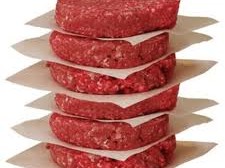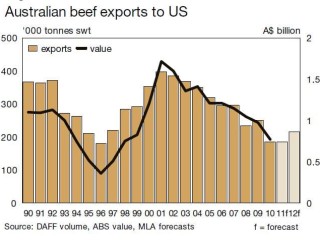 The US market has been a story of high prices, but little reward for Australian beef exporters during the first half of 2011, prompting a significant downward revision in forecast exports for the full year in MLA’s mid-year industry projections released yesterday.
The US market has been a story of high prices, but little reward for Australian beef exporters during the first half of 2011, prompting a significant downward revision in forecast exports for the full year in MLA’s mid-year industry projections released yesterday.
While prices in the US market have been historically high, these have been savaged by the combined effect of the high A$, administrative hurdles for importing and faltering buying from end-users. For January-June, indicative Australian beef export prices to the US averaged 8pc above the same period in 2010, and 15pc above the five-year average.
Additionally, the attractiveness of this market has been eroded by the relative competition of other importing customer markets for manufacturing beef, especially Japan, Russia and South East Asia. Indeed, for the second quarter of 2011, Japan took more Australian manufacturing beef than the US, which is almost without precedent.
Major restraints on the US market have been the ongoing questions over the US economic recovery, high unemployment and faltering consumer demand, the half-year projections said.
The consequent price sensitivity of the US consumer had made it difficult for both imported and local beef suppliers to pass through higher production costs.
“Whilever economic concerns remain and US unemployment stays high, the fortunes of the beef industry are likely to be anchored to the sentiment of consumers,” the report said.
For the first six months of 2011, Australian beef exports to the US totalled just 80,731t – 24pc below the corresponding period in 2010 and the lowest six-month total for several decades.
 For the full 2011 calendar year, exports are now forecast to reach only 185,000t. That would require average monthly shipments of 17,350t between now and December.
For the full 2011 calendar year, exports are now forecast to reach only 185,000t. That would require average monthly shipments of 17,350t between now and December.
While some might view that as optimistic, given that it would require a significant pick-up from the first half, MLA argues the lift should be driven by additional Australian production and an anticipated rise in US beef prices once local domestic US beef supplies recede.
Higher than anticipated US cow slaughter also dampened demand for Australian imported beef in early 2011. Severe drought conditions across the southern US has fostered higher throughput, boosting domestic beef production.
“The ultimate impact of this drought-induced US herd liquidation will be further cuts to the US herd – enhancing prospects for greater import requirements in years to come,” Mr McRae said.
The latest US Department of Agriculture World Agricultural Supply and Demand Estimates forecast that US beef imports will increase a massive 14pc in 2012, more than recovering from an estimated 5pc fall in 2011. The increase in imports for 2012 will be largely in response to an anticipated 4.3pc decline in total US beef production, as the near half-century low cattle herd starts to impact on throughput.
With the decline in production and rise in imports for 2012, total US beef exports are tipped to decline 3.7pc, following a 14pc increase in 2011.
The mid-year projections suggests Australia’s beef exports to the US for 2012 are likely to recover to 215,000t, buoyed by the lower US beef production and historically high prices.
Over the medium-term, the economic situation in the US would be the main determinant of demand for Australian beef, as US beef supplies looked relatively predictable.
“With such low cattle numbers, the US will be facing a decline in both total production and available supplies of cow beef,” MLA’s projections said.
While Australia is expected to be one of the main contributors to filling the shortage, the financial viability of this will be largely set by what the A$ does against the greenback and how much US importers and consumers are willing to pay relative to consumers in alternative and growing markets of Asia, Russia and the Middle East.



HAVE YOUR SAY